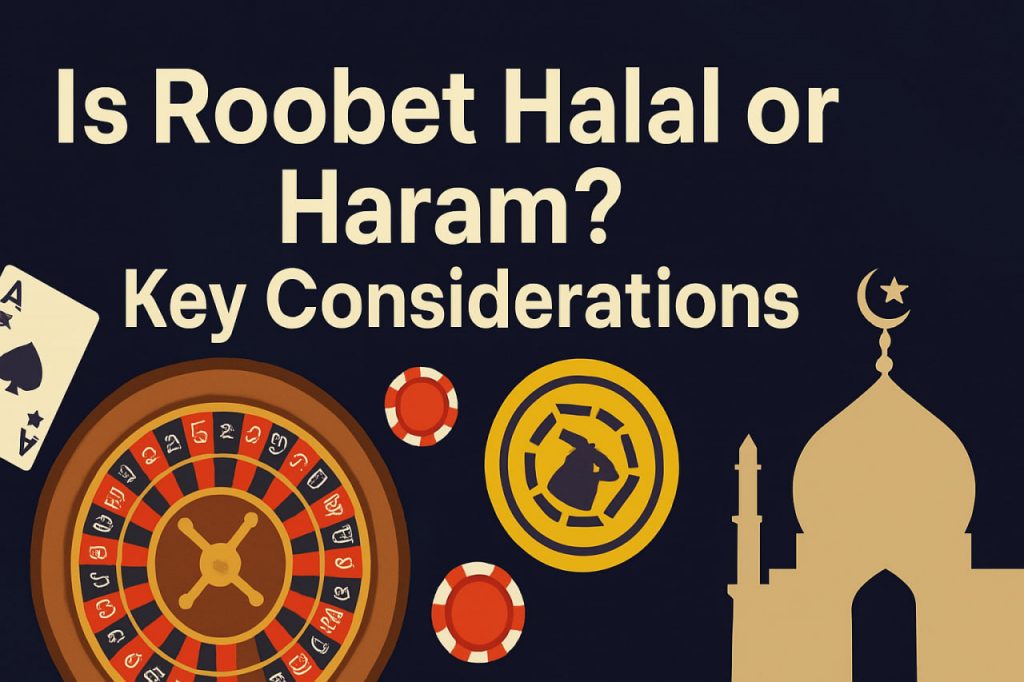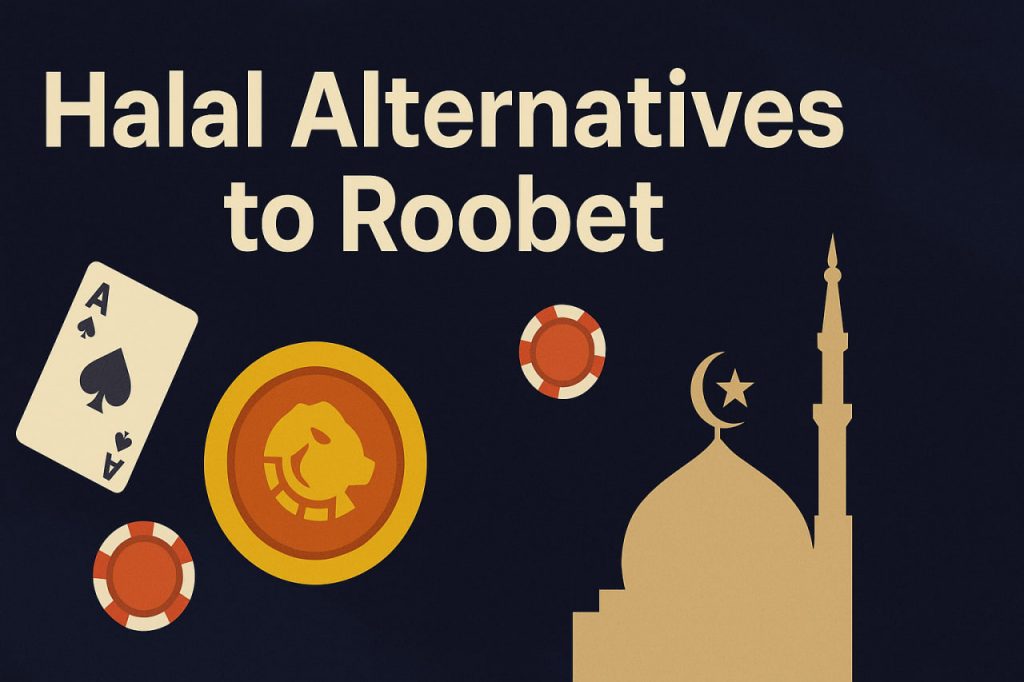Is Roobet Haram or Halal in Islam?

As online gambling platforms continue to grow rapidly in the digital age, an increasing number of Muslims around the globe are faced with a significant and spiritually pressing question: “Is Roobet Haram or Halal in Islam?” This comprehensive article explores the issue in greater depth, examining Islamic principles, scholarly interpretations, Quranic verses, Hadiths, and contemporary digital ethics to determine whether engaging with Roobet is religiously permissible (halal) or forbidden (haram).
What is Roobet?
Roobet is a widely known and rapidly growing online crypto casino that features a broad range of games of chance such as Crash, Roulette, Dice, Slots, Blackjack, and even live casino games. It operates entirely in the digital realm, using cryptocurrencies like Bitcoin, Ethereum, and Litecoin for deposits and withdrawals. Unlike traditional casinos, Roobet doesn’t use fiat currency, which appeals to the tech-savvy and crypto-invested population. Its accessibility, user-friendly interface, and anonymity have made it especially popular among younger users worldwide, including in regions where traditional casinos are banned.
Roobet also markets itself heavily through influencers and YouTubers, many of whom attract large audiences, including Muslims. This marketing strategy, combined with the platform’s sleek design and the promise of quick wealth, makes Roobet a tempting destination. However, the question remains: can a Muslim in good conscience use Roobet without compromising their faith?
Why Muslims Are Concerned About Roobet
Islam offers detailed guidance on nearly every aspect of life, including financial transactions, entertainment, and recreational activities. One of the central tenets of Islamic ethics is that wealth should be earned through lawful (halal) and morally upright means. Gambling, also known as Maisir or Qimar in Islamic terminology, is considered one of the major sins. It is seen not only as an unfair way to earn money but also as a spiritually corrupting activity.
With platforms like Roobet offering flashy interfaces, peer pressure through social media influencers, and the allure of instant rewards, it becomes imperative for practicing Muslims to examine whether such platforms align with or contradict Islamic values. The temptation may be high, but Islamic teachings urge Muslims to be conscious of their earnings and the means through which they achieve success.
Gambling in Islam: An In-Depth Overview
Islam’s perspective on gambling is unequivocally negative. It is not only discouraged but outright prohibited by clear Quranic injunctions and Prophetic traditions. The prohibition is not arbitrary; it is rooted in the wisdom of protecting human dignity, promoting ethical earning, and preventing societal harm.
Quranic Verses
Several verses of the Holy Quran directly address gambling and its dangers:
- Surah Al-Baqarah (2:219): “They ask you about wine and gambling. Say, ‘In them is great sin and [yet, some] benefit for people. But their sin is greater than their benefit.'” This verse highlights that although gambling may offer fleeting entertainment or the possibility of profit, its negative consequences far outweigh any potential benefits. The mention of “great sin” is a severe warning.
- Surah Al-Ma’idah (5:90-91): “O you who have believed, indeed, intoxicants, gambling, [sacrificing on] stone alters [to other than Allah], and divining arrows are but defilement from the work of Satan, so avoid it that you may be successful. Satan only wants to cause between you animosity and hatred through intoxicants and gambling and to avert you from the remembrance of Allah and from prayer. So will you not desist?” This set of verses not only forbids gambling but explains the rationale behind the prohibition: it creates discord, leads to addiction, and distracts believers from their faith and duties.
Hadith
The Prophet Muhammad (peace be upon him) warned his followers about the spiritual, psychological, and social dangers of gambling. Numerous Hadiths explain that gambling can lead to addiction, poverty, social discord, and moral decay. The Prophet emphasized the importance of fair and honest trade, labor, and self-reliance. He discouraged any form of activity where wealth is transferred without fair effort or labor.
Is Roobet Halal or Haram? Key Considerations

When evaluating Roobet from an Islamic lens, several key factors must be taken into account:
| Factor | Details | Islamic Ruling |
|---|---|---|
| Nature of Activity | Roobet involves wagering real monetary value in games of chance. | Haram |
| Use of Cryptocurrency | Cryptocurrency itself is a neutral medium, but its use for gambling doesn’t make it halal. | Neutral |
| Potential for Addiction | Highly addictive features can lead to financial and personal ruin. | Haram |
| Wealth Through Chance | Islam encourages earning through effort, not chance. Gambling bypasses this principle. | Haram |
| No Social or Moral Benefit | Gambling platforms like Roobet rarely offer any broader benefit to individuals or society. | Haram |
| Marketing Tactics | The use of influencers and youth-targeted content can mislead vulnerable users. | Haram |
The Psychology Behind Gambling and Islamic Concerns
Psychologically, gambling can lead to dopamine-driven addictive behaviors, where users chase losses and experience a cycle of emotional highs and devastating lows. It manipulates the reward system in the brain, much like substances that cause physical addiction. Islam prioritizes mental well-being, self-control, and discipline.
Roobet, like other gambling platforms, utilizes colors, sounds, and emotional triggers to keep users engaged. These manipulations are subtle but effective, creating an environment that fosters addiction. Gambling exploits human vulnerability, turning leisure into compulsion. This aligns with why Islam condemns gambling as spiritually and socially corrosive, affecting not only the gambler but also their families and communities.
Scholarly Opinions on Roobet
Across all major Islamic schools of thought—Hanafi, Shafi’i, Maliki, and Hanbali—the ruling on gambling remains consistent: it is haram. Scholars have examined modern interpretations and new gambling formats, including online and crypto-based casinos like Roobet, and they unanimously agree:
- The digital nature of Roobet does not change the core elements of gambling.
- Roobet remains haram regardless of the payment method, be it fiat, crypto, or tokens.
- Income from Roobet, including affiliate commissions, referral bonuses, and game winnings, is considered unlawful (haram) income.
Some scholars go further to caution against passive association with such platforms, including promoting them or creating content that might normalize or glamorize their use.
Halal Alternatives to Roobet

If you’re interested in online entertainment or earning opportunities without compromising your faith, consider the following halal options:
- Skill-Based Games: Games that rely purely on knowledge, logic, or reflexes, without involving any form of betting.
- Online Education Platforms: Learn valuable skills like coding, graphic design, or digital marketing that can be turned into income streams.
- Freelancing: Use platforms like Upwork, Fiverr, or Freelancer to offer services that align with Islamic principles, such as writing, translation, or digital art.
- Shariah-Compliant Investments: Look into Islamic mutual funds, sukuk (Islamic bonds), halal ETFs, and halal stock screening tools.
- Dropshipping and E-commerce: Start your own halal business online through ethical sourcing and fair pricing. Consider opening stores on Shopify, Etsy, or Amazon.
- Create Islamic Content: Use your skills to contribute to the ummah by creating YouTube videos, blogs, or digital resources that spread Islamic knowledge.
Final Thoughts: Is Roobet Haram or Halal in Islam?
In conclusion, the teachings of Islam leave little ambiguity when it comes to gambling. Platforms like Roobet, despite their modern interface and use of cryptocurrency, do not align with Islamic ethics. Gambling is inherently exploitative and offers little to no benefit to the individual or society. The spiritual, psychological, and financial harms caused by such platforms far outweigh any entertainment value they may offer.
Therefore, when the question is asked—“Is Roobet haram or halal?”—the Islamic response is clear and firmly rooted in scripture and tradition:
Roobet is haram in Islam.
Muslims are advised to seek fulfillment and financial growth through halal avenues that promote integrity, fairness, and spiritual well-being. Avoiding haram platforms like Roobet is not only a religious obligation but also a step toward a more ethical and meaningful life. When in doubt, always turn to Islamic scholarship and trusted sources for guidance, and make choices that align with your faith.
FAQs
Yes. According to Islamic teachings and the majority of scholarly consensus, Roobet is haram due to its gambling nature, which contradicts Islamic financial ethics and moral values.
No. Even if no money is involved, engaging in games of chance fosters a gambling mindset. Islam encourages Muslims to avoid anything that can lead to unethical behavior or addiction. Playing for fun still supports a system that is rooted in haram principles.
No. Investing in a company whose primary source of income is from haram activities—like gambling—is also considered impermissible in Islam. Ethical investing requires due diligence into the source of profit. Even indirect association with haram revenue is discouraged.
Islam recognizes human error and offers the opportunity for repentance. If someone used Roobet without understanding its religious implications, sincere repentance, charity, and a commitment to avoid it in the future are encouraged. Allah is Most Forgiving and appreciates when His servants seek His mercy and make efforts to stay on the right path.
